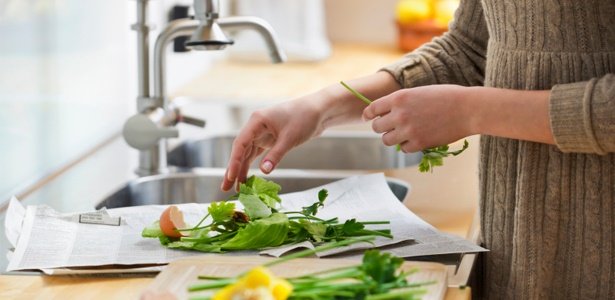Amanda Lewis is the owner of Saucisse Boutique Deli at The Old Biscuit Mill in Woodstock, Cape Town. She prides herself on being an eco-conscious restarateur – the deli only stocks local produce, supports small businesses, recycles and avoids food wastage by donating produce to The Haven Night Shelter once a week.
She shares her tips for living in an eco-conscious space. Have a look at how you can do it too!
1. Start by only supporting your local farmers markets and free-range butcheries. These farmers really care for their produce; the prices may be higher than regular and GMO store-bought products, but at the end of the day you’re buying into your own health.
2. Implement a recycling system in your kitchen. An easy and space effective way is to buy an old second hand filing cabinet, repaint it and place it where your old bin would stand. Each drawer effectively becomes a bin, Starting with plastic, then cardboard, tin, and glass at the bottom. Keep your organic waste in a small bucket with a tight lid. You will be amazed at how little real waste you give off.
3. Switch to gas. With load-shedding more prevalent it’s no secret that we are in an energy crisis. It’s time to start thinking out of the box and experiment with green cooking methods. Solar cooking and the use of Wonderbags can reduce the need for electricity and gas to almost half.
4. When buying products, make sure the containers and packaging for your groceries are in recyclable containers. The universal recycling symbol of three arrows ‘chasing’ one another in a triangle indicates that a product’s packaging is both recyclable and made of recycled materials. You want to avoid polystyrene at all costs as this is highly unrecyclable. I like to buy my pantry products in glass when I can as glass is vastly recyclable and scrap glass, known as cullet, is a key production ingredient added to new raw materials.
5. Make the change to biodegradable cleaning products. There are a wide variety available from local companies. You will be able to find replacements for all of your household cleaning needs. There are thousands of chemicals in common use that pollute our streams and rivers and take a long time to degrade into harmless waste.
6. Take your own bags when shopping, even if it’s for clothing. Now that it has become habit I never go anywhere without my fold up shopping bag inside my handbag. The effects of plastic bags on the environment are devastating. Plastic bags are not biodegradable and therefore they tend to circulate in the environment for a very long time. Plastic bags are often ripped into smaller pieces by the wind which then carries them into our waterways or harms bird and sea life.
7. Upcycle your food waste where possible or give away to a night shelter. I know I can get into the habit of going to the shops after work every evening to get dinner ingredients even though my fridge is full of produce. Start looking at your leftovers and store cupboard essentials as a new creative challenge.
8. Avoid all day slow-cooking methods where possible. Keep your food fresh and raw when you can or use the braai. This automatically reduces the use of electricity or gas in the kitchen. If you can, buy a Wonderbag. They can insulate a hot pot and carry on cooking for up to 5 hours. This cooking method enables you to enjoy delicious stews, curries and soups without worrying about energy consumption.
9. Upcycle your condiment jars and plastic containers. Can you imagine throwing away your wine glass after you’ve finished your tipple? Well that’s basically what we are doing with glass jars and plastic containers. Re-use your jars for spices and drinking glasses. Companies even make money renting out glass jars for cocktail functions so why not do the same and enjoy an eclectic mix of glasses for home. Use the plastic containers for bits and bobs in your garage or for leftovers from dinner.
10. Don’t buy monthly foodie magazines, rather subscribe online and read the digital version (or log onto Food24 everyday for free!). Glossy magazines are much harder to recycle and add to unnecessary clutter in the house. Digital reading also makes it easier for you to save recipes and features that you like.
Have any of your own tips for living more eco-consciously? Share them in the comments section below.

